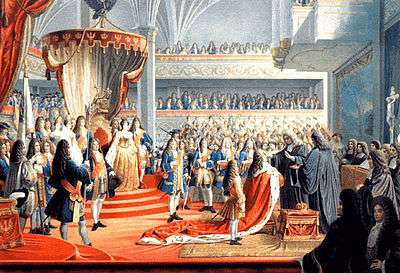King in Prussia
King in Prussia was a title used by the Electors of Brandenburg from 1701 to 1772. Subsequently they used the title King of Prussia.
The House of Hohenzollern ruled Brandenburg as Prince-Electors, and were subjects of the Holy Roman Emperor. Since 1618, the Electors of Brandenburg had also ruled the Duchy of Prussia, which lay outside of the empire, in a personal union. The dual state was known as Brandenburg-Prussia. The Duchy of Prussia was originally a fief that the dukes held of the King of Poland, of whom they were vassals, until the Treaties of Labiau (1656) and Bromberg (1657), with which Frederick William, the Great Elector, had achieved full sovereignty from the Polish Crown. In 1701 Elector Frederick III wanted to show his greatness by adopting the title king.
In return for Hohenzollern assistance in the War of the Spanish Succession and support for the Habsburg candidate in the subsequent election, Emperor Leopold I allowed Frederick to crown himself "King in Prussia".[1]
Legally, Frederick was only an elector in his domains within the borders of the empire; he was only king in his former duchy. Even though Brandenburg was still legally part of the empire and ruled in personal union with Prussia, it soon came to be treated as a de facto part of Prussia.

On 17 January 1701, Frederick dedicated the royal coat of arms, the Prussian black eagle with the motto "suum cuique" imprinted.[1] On 18 January, he crowned himself and his wife Sophie Charlotte in a baroque ceremony in Königsberg Castle.[1]
Even so, Frederick's move was controversial, and only became widely accepted after the Treaty of Utrecht in 1713. The title "King of Prussia" implied lordship over the entire Prussian region, not simply the former Duchy of Prussia, now Kingdom of Prussia, and the assumption of such a title by the Hohenzollern margraves would have threatened neighboring Poland; because the province of Royal Prussia was part of the Kingdom of Poland, the Kings of Poland titled themselves Kings of Prussia until 1742.
Throughout the 18th century the power of the Kings in Prussia continued to increase. They were victorious over the Austrian Habsburg Monarchy in the three Silesian Wars, greatly increasing their power through the acquisition of Silesia. King Frederick II adopted the title King of Prussia in 1772, the same year he annexed most of Royal Prussia in the First Partition of Poland. The kings of Prussia continued to be Electors of Brandenburg until the empire's dissolution in 1806. Brandenburg was then made a province of the Kingdom of Prussia, Berlin officially gaining the status of capital of the Kingdom.